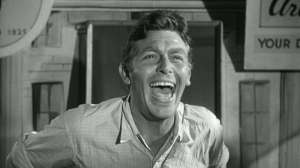The following was written to accompany a film series put together by Ehsan Khoshbakht, Imogen Sara Smith, and myself for a tour in Turkey in late 2018 sponsored by the American Embassy. I don’t know if it was used in this form. — J.R.
“Fake news”, the term paradoxically used by Donald Trump for journalism that exposes his own lies and corruption, evokes what George Orwell called New-speak in 1984, whose slogans included “war is peace” and “ignorance is strength”. Trump’s cleverness as a media manipulator consists of appropriating the very term that describes his own practice while reversing its meaning so that his opponents — including the people who put together this film program about “fake news,” my colleagues and myself — can no longer use it without speaking on Trump’s behalf. This is surely manipulation with a vengeance, where control over both language and presence becomes another form of class inequality. So when TV executives remark that Trump is bad for America but good for television, they’re only suggesting that these two latter entities have separate agendas and even separate owners, neither of which happens to be the American public.
Feeding public fears with worst-case scenarios is the principal form of press manipulation found in Try and Get Me! (1950), Ace in the Hole (1951), and Sweet Smell of Success (1957), all three based on disturbing true-life events—and all three commercial flops on first release, undoubtedly because of their negativity, that are revered today. (A fourth film we wanted to include — A Face in the Crowd [1957] — had to be omitted because its distributor demanded too much money.) In Try and Get Me!, originally and more aptly titled The Sound of Fury, a corrupt press plays a secondary role during the film’s first hour, figuring as just another part of a predatory world ruled by bullies and privilege. But eventually, by actually helping to create a lynch mob, it becomes even more abusive than exploiting a personal accident in a cave in New Mexico to boost a reporter’s career (Ace in the Hole, subsequently retitled The Big Carnival) or catering to a tyrannical gossip columnist’s whims within a claustrophobically paranoid and power-driven world of Manhattan nightclubs (Sweet Smell of Success).
It’s worth noting that victims of the Hollywood Blacklist, future and present, were central to the first and last of these films. Cy Endfield, director and uncredited cowriter (with Jo Pagano) of The Sound of Fury and a former Communist, had to emigrate to England soon afterwards, and even there he had to hide under pseudonyms and behind a front for many years, due to threats by the U.S. projectionists’ union to boycott English films on which blacklisted Americans worked. None of the people who worked on Sweet Smell of Success were blacklisted, but this feature, which came out when the Blacklist was already starting to crumble, exposes various aspects of its machinations and consequences with rare lucidity, and it’s worth noting that one of its independent producers, Harold Hecht, managed to escape the Blacklist only by giving names. Billy Wilder, director and cowriter of Ace in the Hole, managed to remain at Paramount during this period, but significantly he shared with Ernest Lehman, cowriter of Sweet Smell of Success, the credential of having worked as a less-than-respectable gossip journalist himself before he entered the film business, and his jaundiced view of what “success” means and entails in both worlds is part of what gives both Ace in the Hole and its immediate predecessor, Sunset Boulevard, their grimy authenticity.


